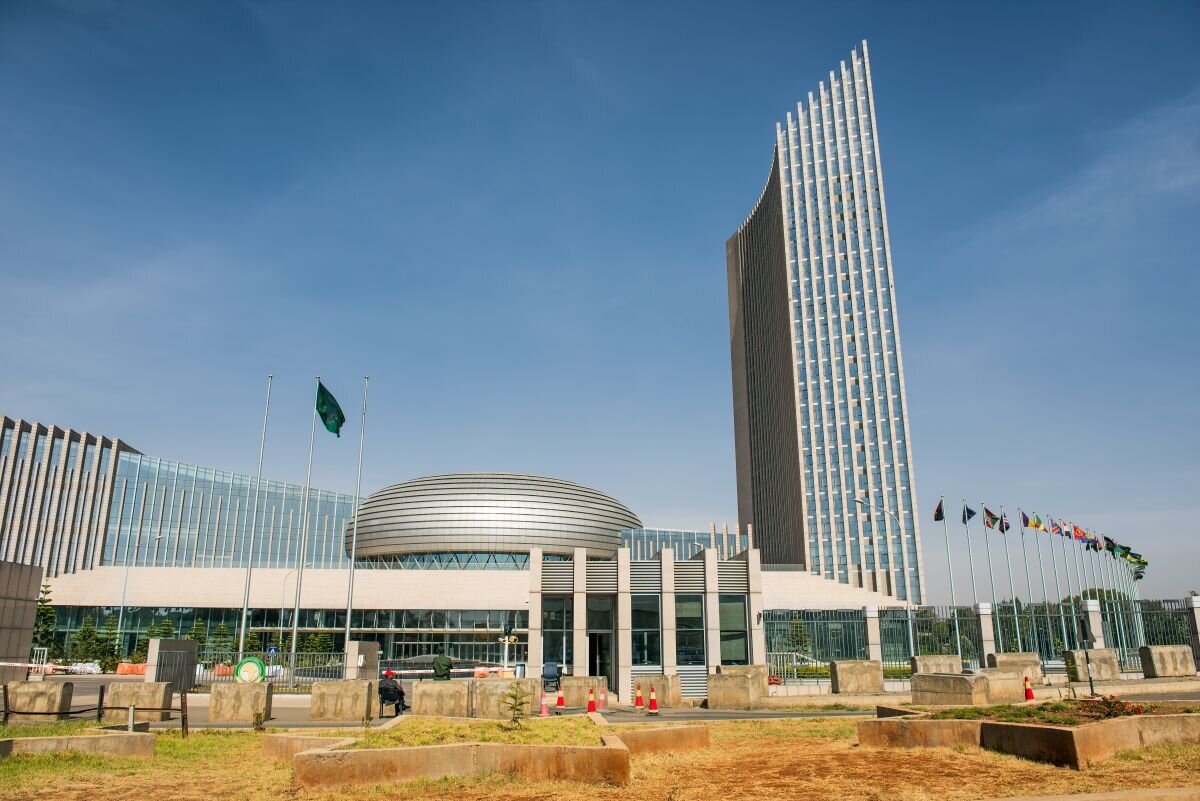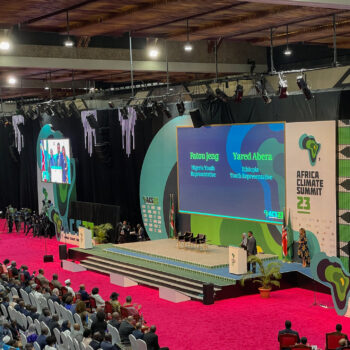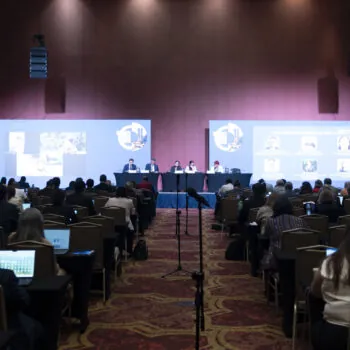From 1-10 September 2025, focus shifts to Africa as a global climate leader and a solution-provider, for UNFCCC’s Climate Week 2 (CW2) (1-6 Sept) and for the second Africa Climate Summit (ACS2) (8-10 Sept) and pre-summit dialogues (5-7 Sept) hosted by the African Union and the Government of Ethiopia, in Addis Ababa, Ethiopia.
- This is a critical moment to drive African leadership and action on the road to COP30 to ensure African voices are heard in multilateral dialogues.
- Unlocking Africa’s renewable energy and clean economy potential will support demand-driven climate action and its global economic development.
- The determination to mobilise climate finance, including for climate adaptation, must be rooted in the needs and priorities of African countries, with measurable finance commitments, stronger African-led platforms, renewed commitment to deep-rooted financial architecture reform, and delivery mechanisms like climate councils that are well funded, coordinated, and accessible.
Story
Africa is at the frontline of climate impacts and a potential powerhouse of climate solutions. CW2 is the last formal UNFCCC convening outside of Brazil ahead of COP30, focusing on technical negotiation issues and implementation, while the Africa Climate Summit is a key political opportunity for African leaders to agree a unified African voice that decisively shapes the COP30 outcomes. Both events must build momentum to carry through to UNGA, Pre-COP, COP30 and G20 moments later this year, ensuring African priorities and needs are recognised and understood. COP30 can be the turning point the world needs to rebuild trust between North and South as it accelerates action.
The UNFCCC’s second global Climate Week (CW2) of 2025 builds on Climate Week 1 in Panama in May, and brings together government negotiators, technical experts and civil society as part of the evolution of regional climate weeks.
The choice of Ethiopia for CW2 sends an important signal that African voices and solutions need to be at the heart of the crucial debates taking place during CW2 on adaptation, climate finance and NDCs; implementation and translating global climate decisions into concrete actions are at the heart of the programme for CW2 with several planned UNFCCC mandated meetings, showcasing innovative solutions through a series of Implementation Labs linked to the COP 30 Action Agenda’s key objectives; and sessions run by the COP29 and COP30 Presidencies.
Immediately after, the larger and more wide-ranging second Africa Climate Summit 2025 (ACS2) is hosted by the African Union (AU) and the Government of Ethiopia. This provides a strategic moment for Africa to shift the global narrative from vulnerability to agency, framing African countries as high-opportunity partner economies, and shape a more just inclusive and climate-resilient future.
- The Summit positions Africa as a global climate leader and a solution-provider, not just a climate-vulnerable region, particularly in renewable energy, carbon sequestration, and community-based resilience.
- The Summit will push for the fair and strategic climate financing needed to scale these solutions and for Africa’s resilient and green development. It will call for a more equitable global financial architecture as it builds on the momentum of the previous 2023 Nairobi Summit which mobilised over $20bn in pledges and led to the Nairobi Declaration, a unified call for reforms to international financial institutions and a range of new global taxes to fund climate action.
- In 2025, Summit leaders seek ambitious and concrete outcomes aimed at mobilising green investment commitments including showcasing multi-billion-dollar projects across various sectors.
International leaders expected to attend this global climate stage include Prime Minister Mia Mottley of Barbados, UN Secretary-General António Guterres, Angola’s President João Laurenço, and President Ruto of Kenya, Democratic Republic of Congo President Tshisekedi, and Ministers and envoys from countries including the UK, Denmark, and Germany. The Summit is expected to hold 50+ official events, 300+ side events (chosen from over 700 applications), 24 national and regional pavilions, and 70+ African-led initiatives to be profiled in a flagship report. See website.
Engage with E3G at CW2 and ACS2
- E3G is participating at both CW2 and ACS2, hosting convenings and dialogues with partners on the ground, including Talanoa Institute, the Climate and Society Institute (iCS), and the Pan African Climate Justice Alliance (PACJA) on topics including adaptation finance, energy developments, Just Transition, climate governance, and mobilising development finance.
- The International Climate Councils Network (ICCN, hosted by E3G) will be co-convening an event with the South African Presidential Climate Commission (PCC) to showcase climate councils as a mechanism for strengthening African climate governance. The event will feature representatives from the PCC and the Nigerian National Council on Climate Change (NCCC) and aims to engage African government officials interested in strengthening national climate governance in their countries.
- There will also be representatives from E3G-hosted Secretariat for the Energy Transition Council leading engagements during the Summit.
Quotes
Rachael Drake, Senior Policy Advisor, E3G, said:
“At COP30, the world must accelerate ambition, implementation, and cooperation to keep the Paris goals alive. Climate Week 2 is a crucial stepping stone — ensuring the voices and needs of some of the most climate-vulnerable countries are heard by the UNFCCC system and donor countries. The focus on translating global climate decisions into concrete, locally driven implementation solutions is imperative as we move into the decade of delivery.”
Franklin Steves, Senior Policy Adviser, E3G, said:
“The inaugural Africa Climate Summit in 2023 elevated African leadership on reform of the international financial architecture, spotlighting new and innovative proposals to deliver the scale of both mitigation and adaptation finance required for climate safety. ACS2 presents an opportunity to revitalise that expansive and ambitious agenda, which has flagged in recent months, with strong Global South leadership that centres a just and equitable transition. The outcome of the Summit will feed directly into the COP30 negotiations on concrete mechanisms to deliver the $1.3 trillion in climate finance goal agreed on in last year’s New Collective Quantified Goal (NCQG).”
Ujunwa Ojemeni, Senior Policy Advisor, Global Clean Power Diplomacy, E3G, said:
“This is the decisive decade, and Africa must be at the heart of the global clean energy transition. The Africa Climate Summit 2 and Africa Climate Week must mark a turning point — where promises are matched by delivery, and ambition by action. Governments, development banks, and investors must act with urgency: redirect climate finance, reform lending practices, and channel capital into Africa’s renewable potential. The time for bold commitments is now — before the opportunity is lost.”
“Africa holds 39% of the world’s renewable energy potential but has received only 2% of global clean energy investment in the past two decades – a gap that threatens both Africa’s development and global climate goals. Initiatives like the Energy Transition Council show how partnerships can help unlock finance to support the acceleration of Africa’s transition and scale its renewable potential. The Africa Climate Summit 2 and Africa Climate Week must be the turning point where ambition is matched by action.”
Isabella Page, Secretariat and Engagement Manager, International Climate Councils Network, E3G, said:
“Strong, transparent, and inclusive climate governance will be critical to achieving international ambition and increasing climate finance flows to Africa. The International Climate Councils Network (ICCN) is attending the ACS2 to showcase African climate councils as a mechanism for strengthening governance at the national level by bridging evidence with policy and enhancing public trust.”
“Climate Councils such as the South African Presidential Climate Commission (PCC) and Nigerian National Council on Climate Change (NCCC) help to ensure that climate policy is informed by evidence-based advice while also engaging diverse stakeholders and guiding governments towards a just and equitable transition.”
– ENDS –
Available for comment
Rachael Drake (EN), Senior Policy Advisor, Climate Politics & Diplomacy, E3G. (climate diplomacy, UNFCCC, negotiations, road to COP30) | rachael.drake@e3g.org
Franklin Steves (EN, FR, ES), Senior Policy Advisor, Public Banks & Development, E3G. (international financial architecture reform, climate and development finance, public banks) | m: +44 (0) 7484 815 434 | franklin.steves@e3g.org
Ujunwa Ojemeni (EN), Senior Policy Advisor, Global Clean Power Diplomacy, E3G. (energy diplomacy, COP30 global stocktake, Energy Transition Council Secretariat representative, renewable energy transition for Africa) | m: +44 (0) 7710 167747 | ujunwa.ojemeni@e3g.org
Vanessa Nakate (EN), Africa Clean Energy Policy Researcher, Global Clean Power Diplomacy, E3G. (energy diplomacy, renewable energy transition for Africa, climate politics for Africa) | vanessa.nakate@e3g.org
Isabella Page (EN, FR), Secretariat and Engagement Manager, International Climate Council Network (ICCN). (climate governance and diplomacy, climate council establishment and capability building, role of climate councils in Africa) | m: +44 7701 275123| isabella.page@climatecouncils.org
Notes to Editors
E3G is an independent climate change think tank with a global outlook. We work on the frontier of the climate landscape, tackling the barriers and advancing the solutions to a safe climate. Our goal is to translate climate politics, economics and policies into action. About – E3G
For further enquiries email press@e3g.org or phone +44 (0)7783 787 863.
Register for our journalist WhatsApp briefing service to receive updates and analysis for key geopolitical and climate events over 2025 on the road to COP30: E3G WhatsApp registration for journalists – E3G.
The Energy Transition Council (ETC) is a multilateral platform, co-chaired by the UK and the Philippines, that unites over 40 governments and institutions offering global political, financial and technical leadership in the power sector. The ETC facilitates donor and development agencies’ coordination to support partner countries’ clean energy transition. https://energytransitioncouncil.org/
The International Climate Councils Network was launched in 2021 to support and amplify the work of a growing network of climate councils: 25 expert bodies officially mandated to advise their national governments on climate policy. Hosted by independent think tank E3G since 2024, the Secretariat’s aims are to build capacity amongst our members, raise their profile internationally, and improve climate governance by strengthening the network. https://www.climatecouncils.org/
Relevant publications:
From Addis Ababa to Belém: Unlocking Africa’s energy future https://www.e3g.org/news/from-addis-ababa-to-belem-unlocking-africa-s-energy-future/
From Panama to Belém: Latin America’s call for bold action at COP30 https://www.e3g.org/news/from-panama-to-belem-latin-america-s-call-for-bold-action-at-cop30/
Navigating the clean energy transition at COP30: Turning strong leadership into leverage for collective action https://www.e3g.org/publications/navigating-the-clean-energy-transition-at-cop30/


